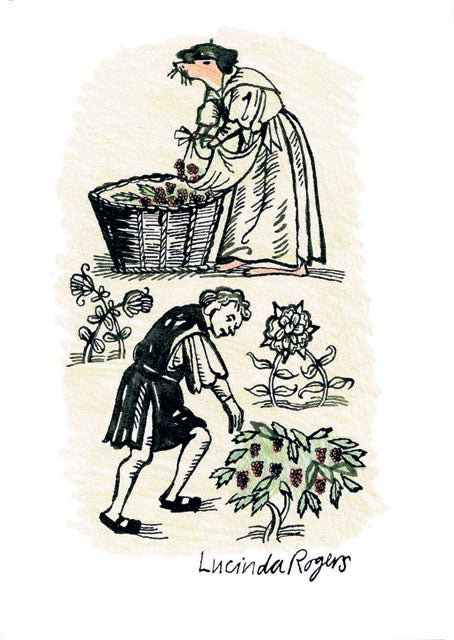The Weasel: Currant affairs

Putting weather on one side, it's the little things you miss when you switch from taking les grandes vacances in Charente-Maritime to having your hols in Filey, North Yorks. By little things, I mean, of course, comestibles. Over the decade that we've been coming to the Yorkshire coast, it has become increasingly possible to persuade one's palate that it is on the Ile de Ré. The sourdough bread from Driffield farmers' market could not be matched at most boulangeries and the same goes for the butter croissants from our village Co-op. It is even possible to get rillettes de porc from the Ginger Pig butchers in Pickering, though the French would find both price and texture on the stiff side. But certain items remain elusive.
When we arrived in the north this summer, I was smitten by the urge for a kir. Arguably, this Burgundian concoction of white wine and crème de cassis (many authorities recommend a ratio of 5:1 but 3:1 is the Dijonnais preference) is the perfect definition of Keats's "beakerful of the warm south". However, inquiries in five Yorkshire supermarkets produced nothing but puzzled looks. "Cream de what, love?"
We finally tracked some down in the Bridlington branch of Morrison's. Festooned with the Diplome d'Honneur of the 1900 Exposition Universelle, the label of the blackcurrant maceration made in Dijon by Gabriel Boudier has a belle époque splendour. Judging by the addictive nature of the resulting kir, the maroon syrup is amply worthy of this award. It was a few days later, when the bottle was showing signs of imminent depletion, that I was struck by a brainwave. Since our local Pick-Your-Own farm obligingly grows blackcurrant bushes, why didn't we make our own crème de cassis?
It has often struck me as a profound mystery that though Britain is the leading grower of blackcurrants in Europe we can think of nothing better to do with them than Ribena. After a few taps on Google, I came up with a recipe for crème de cassis on the website of a company called French Property & Information. Apparently included as a lure for putative expats, the recipe for this Gallic potion presents no insuperable problem on this side of La Manche. Simply cover fruit with alcohol for six weeks, strain and mix with sugar solution, leave to mature for another fortnight and there you are. Bob est votre oncle. There was also a recipe for crème de framboise (raspberry), so I did that as well.
Garnering fruit with punnet on arm, Mrs W resembled a Victorian rendition of the goddess Flora, at least when she was not telling me off for illicit raspberry intake. The recipe called for 45 degree eau de vie, but I think they mean 45 per cent. Either way, it is a bit of a rarity on the Yorkshire Riviera, so we substituted Morrison's Moskova Imperial Vodka (made in Cheshire) at £7 a bottle.
Makers of crème de cassis in France can count themselves lucky that they don't have to support Mr Alistair Darling. Unfortunately, three bottles did not prove sufficient to cover our four kilos of fruit so Mrs W departed for the Co-op. She returned with a bottle of Special Dry Imperial Vodka for £10. "I told them it wasn't for drinking and we only wanted cooking vodka," she explained. "But they'd sold out of the cheapest." Including £14 for fruit, my bill for a taste of France profonde was now over £45. It made me wish I'd stuck to Gabriel Boudier at £8.60 per 500ml.
Still, the alcohol-immersed fruit filling the four specially purchased Kilner jars (I can't bring myself to say to you how much they cost) looked spectacular when I placed them in the greenhouse. It was only at this stage that I scrutinised the small print of the recipe. I had overlooked three significant words concerning the maceration: "Leave the jar in the sun for six weeks." No problem in the Dordogne, but here in Filey we have managed two hours of sunshine in the past four days. It is pelting down as I type these words. Anyone fancy a beakerful of the bracing north?
****
It also rained at the Burton Agnes Jazz Festival held nearby. This is the only jazz event I know where your arrival is delayed by ducks crossing the road and performers are joined onstage by flitting bats. Listening to the dark, urban lyrics of Steely Dan at 11am in the grounds of an Elizabethan stately home is one of my odder musical experiences. The performance by an impressively accurate tribute band called The Dan Collective was the first item in 12 hours of music. Singer/pianist Chris Watts was a spit for the young Donald Fagan. Fortunately, guitarist Andy Hagiioannu had the licks but not the looks (lugubrious walrus moustache) of Steely Dan's erstwhile guitarist Jeff "Skunk" Baxter.
The Dan men were followed by a polished eight-piece swing band called Oct-Opus (there might be a pun here). Our former neighbour Ralph contributed gutsy sax solos, but the sound was a trifle muffled since a cloudburst forced us first into the beer tent, then home. After drying out, we returned in the evening for the punchy rhythms of Cubana Bop, which almost persuaded us that the northern downpour was a tropical storm in Havana. The night closed with Joel Purnell, Leeds' answer to John Coltrane, who introduced his new CD Red Shift – "We're going to bring out the sun". Highly enjoyable, in a refreshing sort of way, it was Jazz on a Summer's Day, Yorkshire-style.
Join our commenting forum
Join thought-provoking conversations, follow other Independent readers and see their replies
Comments